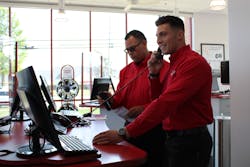In a well-run tire dealership, every year the owner and manager should formally sit down and discuss store performance and job performance. This conversation shouldn’t be an ambush or surprise to the manager. It should be a review of recurring informal conversations all year.
If the owner has dropped the ball and has not been having these conversations all year, then the right thing to do is set goals for the upcoming year.
We all know about setting sales goals, unit count goals and profitability goals. But what about your people? Employees should understand what behaviors are expected of them, especially those in charge of others.
First, if you have a well-defined vision and mission, expected behaviors should mirror what is articulated in those statements. Mission statements are guidelines on how to conduct business on a daily basis and vision statements are about the desired future state of the company. Good vision and mission statements not only identify business results, but also how a business achieves them.
The goals of employees should be defined in clear terms. As an industry, we are pretty good at making sure managers know the expected sales, gross profit, net profit, unit sales and other focus items, like number of alignments, filters, flushes, etc., but we are not typically as clear on employee behaviors.
One of the first things you should look for in your manager is his or her ability to manage oneself. This is about improving strengths, discovering areas of what I call “intellectual arrogance” and acquiring new skills. Peter Drucker, who wrote about managing oneself, said, “We need to know our strengths in order to know where we belong. Focusing on things we do very badly rarely ever improves performance significantly.”
Areas of intellectual arrogance, which everyone has, are things we think we are good at, but the reality is that no one else has that opinion. You may think you’re a good people person, but employees are afraid to bring up mistakes to you, or you may think you’re a good salesperson just because you are number one in your shop.
Intellectual arrogance is best discovered through feedback. And the best way to describe how to do that is by using the tail analogy. If one person says you have a tail, they’re crazy. If two people say you have a tail, it’s a conspiracy. But if seven people say you have a tail, you ought to look behind you and see your tail.
Acquiring new skills is just like that. Going out and learning new things about your job can open up new areas of things you can be good at. You just never tried.
Next, by far and above, one of the most critical skills a manager can have is adaptability. Can your store’s manager take a set of core skills and apply them differently, according to the situation? It’s long been said that there are four types of stores: big busy, big slow, small busy and small slow. Each of these stores requires different skill sets and focus. You can’t apply the same generic plan to all four scenarios.
Additionally, managers need to adapt to their employees. Some like to talk. Some are quiet. Some like direct feedback. Others need more diplomacy. As a manager, it’s your job to adapt to them.
Adaptability also includes emotional intelligence. Long gone are the days of a hot-headed manager yelling and screaming because he’s upset at someone or something. Employees, rightfully, will not tolerate that kind of behavior any longer.
Emotional intelligence is the ability to recognize and manage your emotions and understand the emotions of others. People with high emotional intelligence recognize highly charged situations and focus on the problem — not who caused it and not who needs to be yelled at. It’s not about your own emotions. Those things can be figured out later when the tension dies down and the problem is solved.
Today’s modern manager focuses on his or her team. That means prioritizing respect for individuals, respect for the process and overcoming challenges together. It’s perfectly OK to challenge your managers on how they can improve themselves and improve their team.
Setting goals like one ASE certification for each technician by mid-year should be the store manager’s responsibility. Teaching someone how to do an alignment, if the manager possesses that skill, also is important. Reading a book on leadership and discussing it is a good one, as well.
We aren’t really in the tire business. We are in the people business, from employees to customers to vendors. Sure, it’s tire and auto service problems we usually solve, but how you do it matters most.
About the Author

Dennis McCarron
Dennis McCarron is a partner at Cardinal Brokers Inc., one of the leading brokers in the tire and automotive industry (www.cardinalbrokers.com.) To contact McCarron, email him at [email protected].
